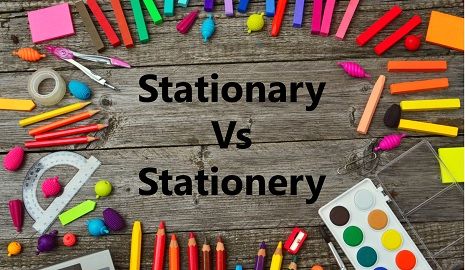 The words stationary and stationery are homophones which have exactly similar pronunciation, but there is a minor difference in the way they are spelt, i.e. one is spelt with an ‘a’ whereas the other has an ‘e’ in its spelling. Stationary is a condition wherein something is not in motion, whereas stationery is an umbrella term, for writing material and office supplies.
The words stationary and stationery are homophones which have exactly similar pronunciation, but there is a minor difference in the way they are spelt, i.e. one is spelt with an ‘a’ whereas the other has an ‘e’ in its spelling. Stationary is a condition wherein something is not in motion, whereas stationery is an umbrella term, for writing material and office supplies.
Now let’s have a look at the examples given below to understand the difference between these two:
- I saw a stationary bike, near the stationery shop.
- After seeing a tiger, Raman stood stationary and dropped all the stationery in his hand.
- During the checking process of the student’s stationery, they were ordered to remain stationary.
In these two examples, the word stationary implies a condition, in which a person or object is in a fixed position and not likely to change, whereas the word stationery is a collective term for any items used in offices for documentation and writing.
Content: Stationary Vs Stationery
Comparison Chart
| Basis for Comparison | Stationary | Stationery |
|---|---|---|
| Meaning | The word 'stationary' is used for a person or object which is not in motion, i.e. still. | The word 'stationery' can be used in pervasive way, for all office supplies and writing stuff. |
| Used for | Any person or object which is not moving. | Only for the material used for writing and office. |
| Part of speech | Adjective | Noun |
| Examples | I crashed my moped into a stationary car. | You can find the best quality stationery at this shop. |
| The doctor advised me to stop working in a stationary position for long hours. | The manager appointed an office boy, to look after the use of stationery at the office. | |
| There is a row of stationary vehicles at the parking lot. | I have to buy stationery for my exams. |
Definition of Stationary
When we talk about a person or an object which lacks motion, i.e. stable at one place in a particular position and remains unchanged, we use stationary. Hence, it indicates someone or something, whose position, condition, state or value is fixed or stays the same.
For example:
- The train remained stationary for four hours.
- Petrol prices remained stationary for a week.
- A situation of traffic jam arose due to stationary cars.
- The doctor said that the condition of the patient is stationary.
- Alex is injured because he rammed into a stationary bus, at the roadside.
Definition of Stationery
Stationery is a comprehensive term for all the stuff required in an office, school or college for writing and printing like pen, paper, pencil, eraser, highlighter, marker, ink, sharpener, ruler, envelope, register, notebook, file, books, paper pins, thumb pins, drawing sheet, paintbrush, colors, sketch pens, charts, geometry compass, post-it notes, binder clips, etc.
Further, it also includes tools and equipment used in companies for daily office work like a hole punch, stapler, calculator, paper clips, paperweight, pen stand, stamp pad, scissors, transparent tape, whitener, glue, and so forth.
For example:
- The company created a monthly budget for stationery.
- Take a left from the stationery shop, to reach the grocery shop.
- I bought these pen from the stationery store at the New Market.
- You can find the stationery section at the end of the departmental store.
- Joe decided to write a novel, but the box where he keeps stationery items was found missing.
Key Differences Between Stationary and Stationery
The points presented below will help you in understanding the difference between stationary and stationery:
- We use the word ‘stationary’ for anything which stays at a particular place and position, i.e. inactive. On the other hand, the word ‘stationery’ can be used for all the items, which are used for the purpose of writing and printing in an office or in school/college such as pen pencil, eraser, ruler, file, papers, etc.
- We use ‘stationary’ for someone or something which is not moving, i.e. it is in a fixed position and condition. Conversely, stationery is used for anything which is used for the purpose of writing and documentation, in offices, colleges and schools.
- The word ‘stationary’ is an adjective, which indicates the characteristic or virtue of a noun. As against, stationery is a concrete (material) noun.
Examples
Stationary
- During a robbery in the bank, the hostages are ordered to stay stationary.
- The condition of the dog has remained stationary.
- The stock prices remained stationary for two days.
Stationery
- The child has thrown the stationery on the ground.
- Could you please tell me, where can I find the stationery?
- We decided to meet at the cafe cum stationery.
How to remember the difference
So, the best tip to remember the difference between stationary and stationery is that you can use the word stationary when someone or something is standing still in a fixed position and not moving. As against, stationery implies a collection of all the items used in writing, such as paper, pen, envelope, pencil eraser and so on.






milay says
keep it up, guys